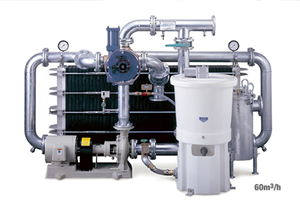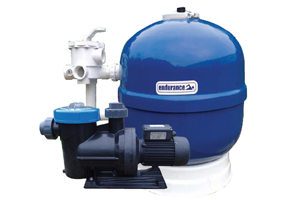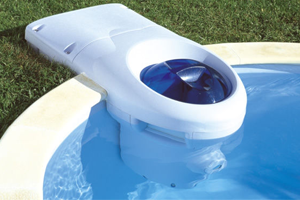A swimming pool filter is one of the most important pieces of pool equipment a swimming pool owner will ever buy, and the right one can make a big difference in properly maintaining your above ground or in ground swimming pool, and your swimming pool water. At Specialty Pool Products, we carry a complete line of swimming pool filter systems, at the lowest prices available.
The basic purpose of a swimming pool filter is to remove dirt, debris & fine particles from the pool water, so that it remains clean & clear during the swim season. Swimming pool filters work in combination with a swimming pool pump, and are typically available as a stand-alone piece of equipment, or with the pool pump (known as the entire “filter system”). The pool pump forces pool water through the pool filter, which in turn cleans & filters the water. Then the pump returns clean, filtered water back into the swimming pool. In addition to cleaning & enhancing the clarity of your pool water, top-quality swimming pool filters also provide durability, long life, ease of use & low running costs. They can also reduce the amount of time you need to spend on pool maintenance. There are three different varieties of swimming pool filters (any of which will effectively maintain your pool water, and are appropriate for inground and aboveground pools): sand filters, cartridge / element filters, and diatomaceous earth (DE) filters. At Specialty Pool Products, we can help you select the right brand, type and model of swimming pool filter system, based on your swimming pool, your preferences and your budget.
Both aboveground sand filters and inground sand filters are available at Specialty Pool Products. They are the most common variety of swimming pool filter. With a sand filter, unfiltered water is forced through a sand bed within the filter, where debris is removed from the dirty water before it is sent back into the pool. Cleaning a sand filter is quick & easy – simply run water through the filter in reverse, while disposing of the wastewater. Advantages of sand filter systems include ease of operation and relative low cost. Plus, the medium (sand) can last between 1-5 years (1-2 years for aboveground sand filters; 3-5 years for inground sand filters. Disadvantages include the fact that water will not be quite as polished as with a D.E. or cartridge filter. Sand filters typically filter particles to 20 microns (the human eye cannot see particles smaller than 40 microns).
Cartridge filters are another easy to use, economical and low maintenance choice. Both aboveground cartridge / element filters and inground cartridge / element filters are available at Specialty Pool Products. These swimming pool filters utilize a replaceable filter cartridge / element that you simply drop into the unit. The cartridge needs occasional cleaning during the swim season, which can be easily done with a standard garden hose, or with specially designed filter cartridge cleaners. Filter cartridges are generally replaced every 1 – 2 years, depending on type of swimming pool, pool usage and swim load. Advantages of a cartridge filter system include lower initial cost and ease of maintenance. Disadvantages include the fact that they can clog more quickly in water environments with lots of algae, and that the filter needs replacing on a regular basis (every 1-2 swim seasons). Cartridge filters typically filter particles as small as 10-15 microns. And SPP carries a complete line of replacment filter cartridges, saving you time, money and effort!
Finally, there are D.E. filters – a type of pool filter that is super-effective at removing very small particles from pool water, making it perfect for those who demand the finest filtering possible. Both inground D.E. filters and aboveground D.E. filters are available at Specialty Pool Products. Both useDiatomaceous Earth as the filter medium. Diatomaceous Earth is a naturally occurring, chalk-like sedimentary rock that has an abrasive pumice-like feel, and is very light & porous. D.E. is crushed into a fine powder for use in pool filters, and is typically composed of silica, sodium, magnesium & iron.Synthetic D.E. substitutes are also commonly available. D.E. filters are cleaned in the same general way as sand filters, except new D.E. powder is added after each cleaning. Advantages of a D.E. swimming pool filter is extra-sparkling pool water, extra quickly! This type of filter captures the smallest of particles (to 3-5 microns), the first time through the filter. Disadvantages include higher front-end cost, and the need to add new D.E. powder after cleaning (backwashing). Specialty Pool Products carries both D.E. and D.E. substitute filter media, making it fast, easy and inexpensive to maintain your new D.E. Filter.
Regardless of which type you choose, you should always purchase a filter that is a size larger than the minimum required for your swimming pool or spa’s capacity. With a larger filter area, you’ll clean the filter less, and spend more time enjoying (not maintaining!) your swimming pool. You should also select a system that requires the least amount of pumping power to achieve the desired flow rate. That’s because lower pumping power means lower running costs, for lower utility bills.
To decide which type of swimming pool filter is right for you, consider what is more important to you – water clarity or ease of operation. If you want the cleanest, clearest water in town you’ll want to consider a D.E. filter. If you prefer the ease of simply backwashing your sand filter or cleaning a cartridge a couple times a year, you’ll want to consider these two types of pool filters. The fact is – all filters work… the goal is to fit the correct filter to your needs. Have questions? Give the Pool Experts at Specialty Pool Products a call at, 03 111 187 187



